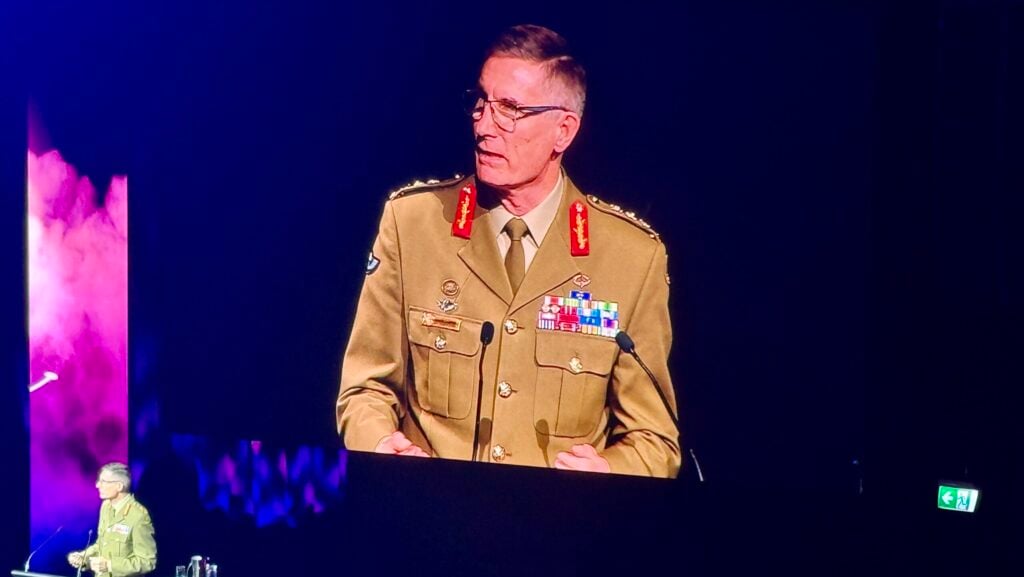Air Warfare, Global, Naval Warfare
In fiery speech, Aussie defense chief urges support for ‘extraordinary’ AUKUS subs

Gen. Angus Campbell, chief of the Australian Defense Force, speaks in Canberra at Air & Space Conference on May 9, 2024. (Colin Clark/Breaking Defense)
CANBERRA — With controlled passion, the chief of the Australian Defense Force today offered a ringing rebuttal of critics of the AUKUS plan to buy and build nuclear powered attack submarines.
Gen. Angus Campbell, making what is likely one of his last speeches before retirement, called on his countrymen to “Get in the ring, give it a go, because we are delivering nuclear powered submarine capability to this nation — full stop — and it will be an extraordinary program.”
He contrasted the AUKUS effort to other major works in his country’s history, saying: “I would ask you to reflect on so many other occasions when Australians, cringing, disappointed themselves by declaring the Sydney Harbour Bridge’s two halves will fall into the ocean. The Sydney Opera House will never be the greatest opera house on the planet. The Snowy Mountains hydro scheme will fail somewhere in the mountains. The Collins class submarine — worst submarine on the planet.”
Campbell’s rhetoric is uncharacteristic of the country’s top officers, who is seen as cerebral and controlled in public. Now that he is on the last stretch of his term, Campbell may feel compelled to defend what will become an important part of his legacy, as the decision was made to buy the nuclear subs on his watch.
Critics of the AUKUS deal have said everything from the subs’ total cost — estimated at $368 billion AUD ($243 USD) — is too big, the capability of the nuclear-powered subs isn’t needed, Australia has to wait too long before buying its first of at least three Virginia-class submarines in 2032, and it forces Australia to rely too much on the United States, which many Australians fear may be a less reliable ally than it has been.
At the end of his speech at the annual two-day Air & Space Conference, Campbell was also pressed about Chinese claims that one of its J-10 fighters operated in a “professional and safe” manner when it dropped flares in front of an Australian MH-60R Seahawk helicopter.
The Australian helicopter and its mother ship, HMAS Hobart, were operating in international waters in Yellow Sea, performing sanctions patrols to keep watch on efforts to illegally supply North Korea.
Campbell flatly rejected Chinese claims that the Australian aircraft had maneuvered proactively. “The helicopter was behaving in a correct and disciplined fashion, and I don’t accept that the response was anything but unsafe and unprofessional,” he said.
China’s Foreign Ministry spokesperson Lin Jian previously put forward a different version of events, during a press briefing.
“What truly happened was, an Australian military aircraft deliberately flew within close range of China’s airspace in a provocative move that endangered China’s maritime and air security in the name of enforcing UN Security Council’s resolutions,” said Jian. “The Chinese military took necessary measures at the scene to warn and alert the Australian side. The way the situation was handled was consistent with our laws and regulations, professional and safe. China has lodged serious protests to the Australian side on its risky moves.”
Since Australia first published news of the incident the discussion in Canberra has escalated to criticism by the opposition Liberal Party, which called for the prime minister to make representations directly to Chinese President Xi Jinping about the incident. And then the prime minister weighed in.
“There’s no question that the Australian Defence Force personnel were both in international waters and in international airspace,” Prime Minister Anthony Albanese told reporters in Perth on Wednesday.
“In the circumstances that occurred we were not satisfied, and very reasonably not satisfied with regard to both safety and professionalism,” Campbell said at the conference. He did not say if he would contact his Chinese counterpart.
Australia has not released any video of the encounter, and it’s not known if there is any. But Britain’s Air Force Chief has suggested Australia should release any imagery it had of the confrontation to help call out China’s “unprofessional” conduct.
The head of the Royal Air Force, Air Chief Marshal Sir Richard Knighton, told the Australian Broadcasting Corporation at the conference here that publicizing any video of a dangerous incident can show “why it’s dangerous to conduct them in that unprofessional way and how that can lead to miscalculation and ultimately to accidents which I think would be an awful outcome through sheer incompetence and lack of professionalism”.